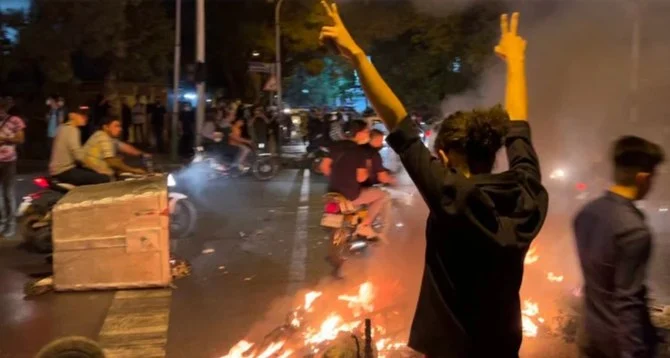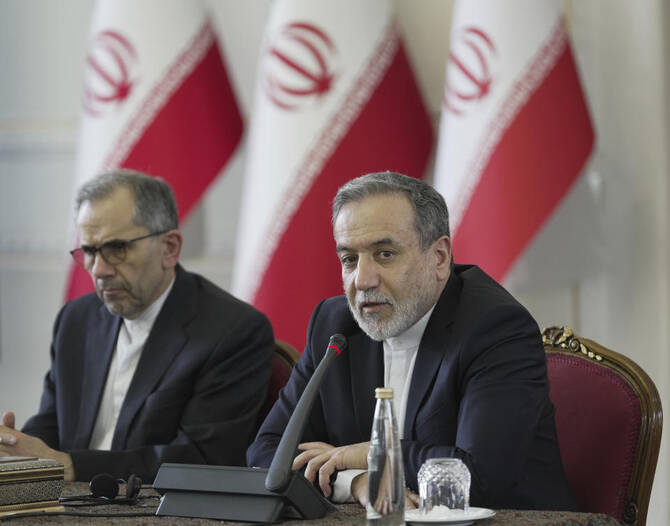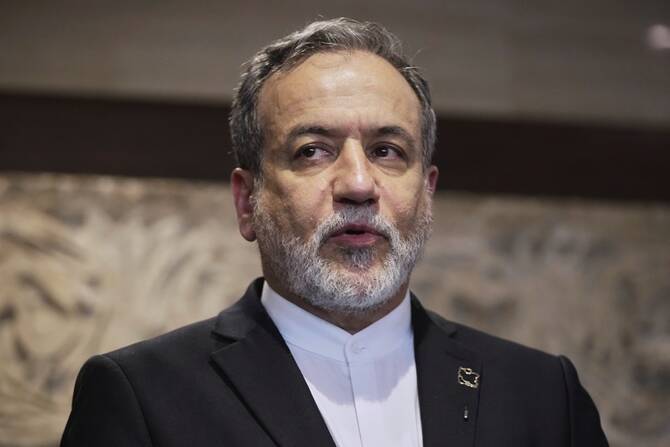LONDON: Iran’s leadership has “zero answers” to the population’s “very legitimate” demands, and its brutal crackdown on nationwide protests will shape society for years to come, a UK panel has heard.
The regime in Tehran is “perhaps the most insular and least qualified in the history of the Islamic Republic,” Iranian-American Washington Post columnist Jason Rezaian told a webinar organized by London-based international affairs think tank Chatham House.
Thursday’s event, titled “The Islamic Republic at 44” and attended by Arab News, was moderated by Sanam Vakil, Chatham House’s Middle East and North Africa program deputy director.
It included Rezaian; Azadeh Pourzand, director of the Siamak Pourzand Foundation, which promotes freedom of expression for artists, writers and journalists; and Kian Tajbakhsh, senior adviser for Columbia Global Centers, which are research outposts established by Columbia University in different locations worldwide.
Rezaian and Tajbakhsh, both dual nationals, have faced political persecution and imprisonment in Iran at different times.
Rezaian described the protests that erupted in Iran last year as “unprecedented.” The standard of living and quality of life in the country have “plummeted across the board,” he said.
“There’s no coming back” from the regime’s brutal crackdown, Rezaian added, referring to the killing of innocent people, including children, and the stifling of Internet access nationwide.
The origins of public anger lie in deteriorating economic conditions, with the Iranian state “no longer delivering on basic services” and “people failing to see their lives improving,” he said, adding that the regime has “zero answers.”
However, he warned against the West failing to enforce economic sanctions on Iran. “If we don’t activate the international levers of justice to hold the regime accountable, it (sanctions) is all for show,” he said. The threat of Iran’s nuclear capability is also an issue that “can’t be ignored,” Rezaian added.
Tajbakhsh said the roots of the “toxic relationship” between the US and Iran lie in the regime’s “extremely consistent and coherent” rejection of Western ties.
Panelists discussed the future of the Iranian protest movement, with Rezaian and Tajbakhsh predicting that the “culture war” in the country would shape society for years to come.
However, Tajbakhsh warned: “The bad news is that the regime has succeeded in repressing and controlling the protest movement.
“Protests remained restricted to a narrow band of people from their late teens to late 20s, and failed to expand to the urban middle class or the military.”
Pourzand described the nationwide demonstrations as a “quest of a people for an ordinary life,” adding that “dignity and quality of life” are the key demands of the public.
From now on, the regime, which “lacks any form of accountability” and has “lost all legitimacy in the international arena,” is “only buying extra time,” she said. The resilience and creativity of the Iranian people offer hope for the future, Pourzand added.
However, Tajbakhsh argued that the economic situation in Iran’s urban centers, including Tehran, “is often not as dire as presented by the international media.”
The protest movement represents only a small section of the country, he said, adding that the demonstrations and crackdown represent “competing visions of society that will clash over the coming decades.”
Tajbakhsh said: “The striking thing about the government response is its solidarity. There was almost no dissent from any senior officials or clerics, which demonstrated the remarkable unity of the regime.”
The high price of repression, the tolerable economic situation, and the lack of effective alternative political organization have made the middle class reluctant to join the protest movement, he added.
“If you look at Iran, it’s remarkably successful. It’s stomping across the Middle East, it outwitted the West in Syria, and it controls a country bordering Israel,” Tajbakhsh said, referring to Lebanon.
,
“It maintained this and has remained in power over many, many decades. It has avoided political fissures, circumvented sanctions, as well as provided enough economic welfare so that the stakes of the middle class to overthrow the regime are too high.”
It will never alter its behavior as long as it has the support of key regional allies, he added, warning that protests and revolts are “an ordinary day’s work for authoritarian regimes.”






















